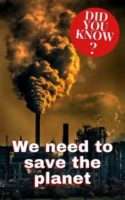The Earth is on fire, in some places quite literally. We are running out of non-renewable energy. Some scientists estimate that we only have about 50-114 years left before life changes dramatically – and not for the good! The earth’s population is growing exponentially and food security is not guaranteed.
What does this all mean? Basically, it means that the way we are living needs to change. Drastic action must be taken to save the planet.
While this may not seem like your problem right now, it’s important to think about future generations of people – your children, grandchildren and great-grandchildren. What kind of world do you want to leave for them?
What is climate change?
Earth has seen fluctuations in temperature throughout the millennia. However, since we became more industrialised, temperatures have soared past what is considered normal. The emission of greenhouse gases has changed the Earth’s atmosphere. This affects humans, animals and the natural environment.
Such effects include not only rising temperatures and sea levels but also more indirect effects like an increase in hunger and water crises, a loss of biodiversity (the death of various plant species), and worsening economies due to the cost of trying to fix the damage.
What is being done?
Once a year, in a different city in the world, political leaders meet at the United Nations Conference of the Parties (COP) summit – the hugely influential and controversial climate change conference. This year COP26 took place in November in Glasgow, Scotland.
During the conference, close to 200 diplomats made an agreement to urge governments to return to the conference with more concrete plans to fight climate change. The agreement also calls on wealthier nations to double their funding into stopping the phenomenon.
American politician John Kerry noted at the start of the summit that COP26 was “the last best hope for the world to get its act together.”
He may very well be right. The Earth’s temperature has warmed by 1.1 degree Celsius. Scientists have deduced that if temperatures rise past 1.5 degrees we could be looking at incredibly high temperatures and shortages in water globally. (slightly repetitive -do we need this? Though I guess it does bring the point home!)
Not everyone was enthusiastic about the COP26 conference, however, with rallies and protests being held by young climate activists who feel governments are not doing enough.
“This is no longer a climate conference,” said Greta Thunberg, climate activist from Sweden. “This is now a greenwashing festival.”
What can you do?
While you may feel powerless in the fight against climate change, you are not. There are many things you can do to help save the planet.
1. Use your voice – write to your mayors, councillors and politicians telling them that they need to do more about climate change in your community and our country.
2. Watch what you eat – eating lots of meat and dairy actually has a negative effect on the plant. Cutting down on these products is one of the easiest and most impactful things you can do to contribute to saving the planet.
3. Think about what you buy – everything you purchase has an effect on the planet. Try to recycle and not to buy single-use products (products that cannot be used again or recycled).
4. Educate those around you – people not knowing about climate change is one of the biggest threats the planet. If you know enough, take some time to talk to your family, friends and colleagues about what is happening and how they can help.
This might all sound very scary. Unfortunately, it is very scary. The good news is that there is still time to do something about it. If we all do our bit, doing something every day to make a difference, we can save our beautiful planet.
***
Do you want to learn more about recycling? Read this article to find out.
Tell us: What do you think you can do to help beat climate change?


